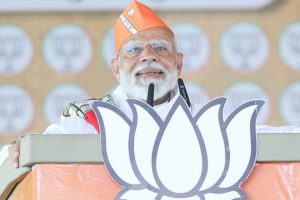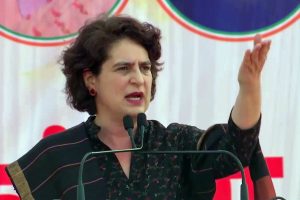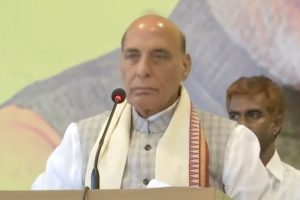Few years back, eminent jurist Fali S Nariman spoke at a function in Rashtrapati Bhawan ~ the timing, setting and audience with the First Citizen of India, the President, and judicial luminaries in tow, was telling.
The apolitical voice of constitutional propriety had presciently insisted that “for an effective democracy to function, there must be dissent and some consequential disturbance as well”. However, since then, expressing dissent has only become more challenging, and perceptions of enfeeblement of the various institutions has only gained credence.
Hyper-nationalism is the default ‘go-to’ context, for any issue. Any dissent is instinctively equated to anti-nationalism, as the sovereign is made equivalent to the government. Hyper-nationalism in India, with a rainbow of ‘minorities’, is increasingly predicated on majoritarianism. As electoral considerations can lead the executive to compromise on the inclusive spirit of constitutional morality, willfully or inadvertently, and with other checks-andbalances institutions also diminished ~ this leaves only the ‘conscience keeper’ of the Constitution, in the Rashtrapati Bhawan, to intervene.
The Indian Constitution, as the world’s longest with over 145,000 words (the US constitution has only 4,400), is surprisingly sparse and ambiguous on the role of the President of India. While BR Ambedkar likened the Rashtrapati to England’s sovereign i.e., King/Queen, the interpretative verdict on this after 75 years of independence, is still out there.
The exact role has depended on the personality of the occupant of the majestic Rashtrapati Bhawan, and to the sincerity towards constitutional commitment by the dispensation of the day, on whose ‘advice’ he/she is bound to act upon. Occupants of this 340-room grandeur, about which Lord Wellesley had said “India should be governed from a palace, not from a country house”, have included some of the most distinguished citizens like Dr Rajendra Prasad, Dr Radhakrishnan, Dr Zakir Hussain, KR Narayanan, Dr APJ Abdul Kalam and such personifications of the lofty ‘Idea of India’.
The building has also had its share of lackluster inhabitants, the proverbial ‘rubber-stamps’. During tenures of the latter type, that critical option of beseeching the ‘conscience keeper’ of the Constitution has remained either inaccessible or unresponsive, and therefore rendered the national discourse poorer. Seventy-three years of the ‘Republic’ are testimony to the fact that all dispensations have sought occupants who would desist from contributing to the alluded ‘consequential disturbance’.
It started with the disquiet in interpreting the role of the first President between Dr Rajendra Prasad (who was ironically the President of the Constituent Assembly that drafted the Constitution) and his Prime Minister, Jawaharlal Nehru. Doyens of constitutional sensitivity and rectitude like him seeded the non-partisanship and independence of the ‘institution’ of the Rashtrapati.
The likes of Dr Prasad ‘advised’ the Prime Minister, as much as they were obligated to receive the same. They interpreted the Presidential oath entailing, ‘preserve, protect and defend the Constitution’ as also, ‘I will devote myself to the service and well-being of the people of India’ as a personal responsibility, beyond owing allegiance to the partisan powers that secured their term. While this hallowed oath is purely a moral obligation, and not a legal obligation ~ it reflects singularly on the morality of the individual and of the dispensation, that seeks his/her ‘pleasure’.
Presidential intervention shapes and defines that vital ‘consequential disturbance’, just as the lack of it signifies the waste of that power and more importantly, responsibility. The expression and trigger of that careful intervention is key, as it needs to enrich and reiterate the profundity of constitutional morality, and not curb the same.
Rashtrapati implies a lot via symbolic acts like, ‘returning files for reconsideration’, exercising ‘pocket veto’ or deliberate inaction on a file (used sagaciously by President Zail Singh, to posit a powerful message of public concern) or even through use of words drafted by the incumbent in speeches and not read rote as given by the government.
President APJ Abdul Kalam had famously prefaced a government-drafted speech with a self-written poem in Tamil, ‘Where are We’, which unmistakably critiqued Parliamentarians and their behaviour. KR Narayanan who described himself as ‘working president’, albeit ‘within the four corners of the Constitution’ established Rashtrapati Bhawan communiques to explain his mind, whilst exercising those discretionary powers in a spirit of public transparency. Such activism from Rashtrapati Bhawan did not weaken our democratic impulses, but ‘checkmated’ the tendency to ride roughshod over the ‘intent’ of the Constitution, as framed by the founding fathers who thought beyond partisanship. Intellectual integrity matters too.
When one has held offices like the Vice President of India, Cabinet Minister, three consecutive Lok Sabha terms, Ambassador of India to US, China etc., Vice Chancellor of JNU and taught in the Delhi School of Economics or have been in the foreign services where he was the ‘best diplomat of country’ (1955), to even suggest the tokenism of first Dalit President on KR Narayanan may be factual, but woefully inadequate to his body of accomplishments. Such Presidents could, and would, voice themselves.
From expressing concerns on the 2002 riots, to the seasoned statesman tutoring a visiting American President against alarmist descriptions of the region and warning against acting like a ‘village headman’ – the cerebral colossus routinely demonstrated that he was nobody’s man, except his commitment to the ‘Idea of India’, and its moral equilibrium.
Throughout his presidency, he desisted from visiting places of worship or interacting with godmen/godwomen, as he thought emotions and optics of ‘distance’ from religiousity, would serve India better. He was the first, and last, to do so. Today, polarisation and division of society has peaked and many desperately seek the safety and dignity of constitutional succour and find that the Rajpath leading up to the imposing structure of the Rashtrapati Bhawan is demolished considerably, both literally (with the Central Vista Project) and more importantly, figuratively.
Many executive actions and contentious bills that have been passed in recent times were denied the vital opportunity of ‘consequential disturbance’ in the corridors of power. The protected citizenry, “We the People”, seek and deserve that empowerment and recourse to afford ‘consequential disturbance’, for the sake of democracy.
(The writer is Lt Gen PVSM, AVSM (Retd), former Lt Governor of Andaman & Nicobar Islands and Puducherry, and a former Military Secretary to Presidents Narayanan and Kalam)











